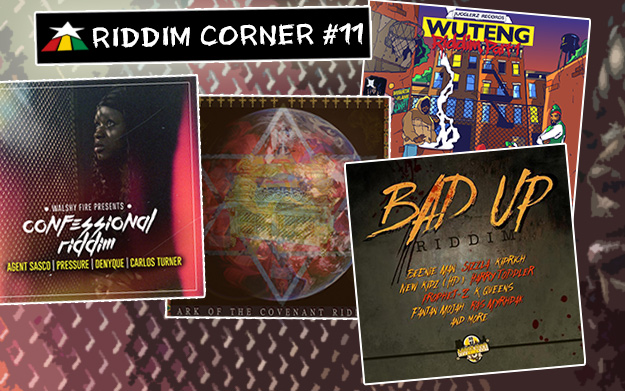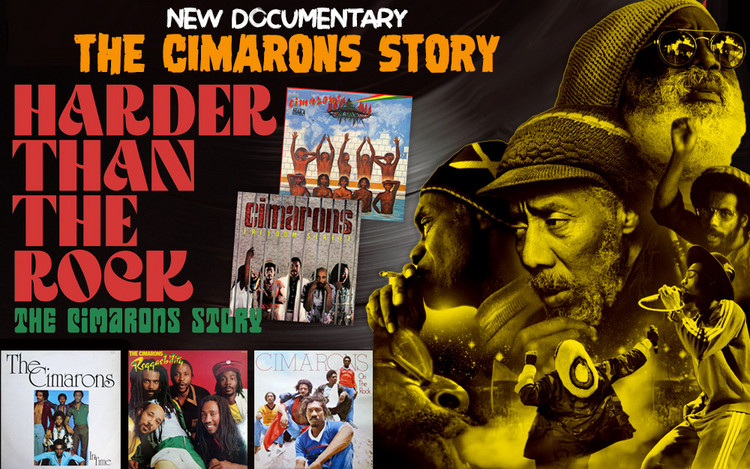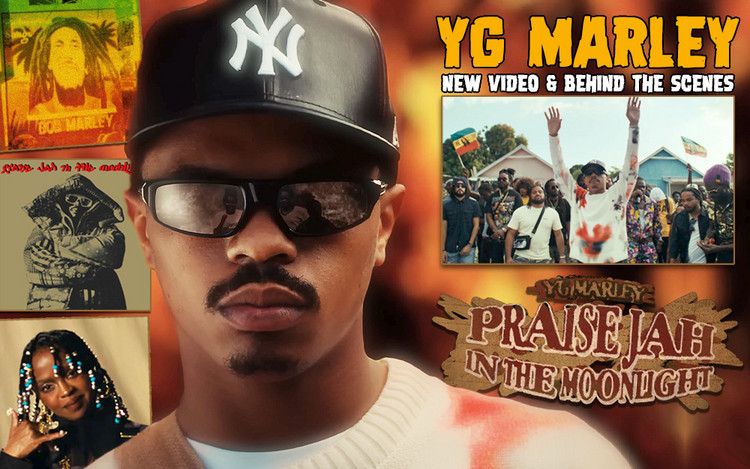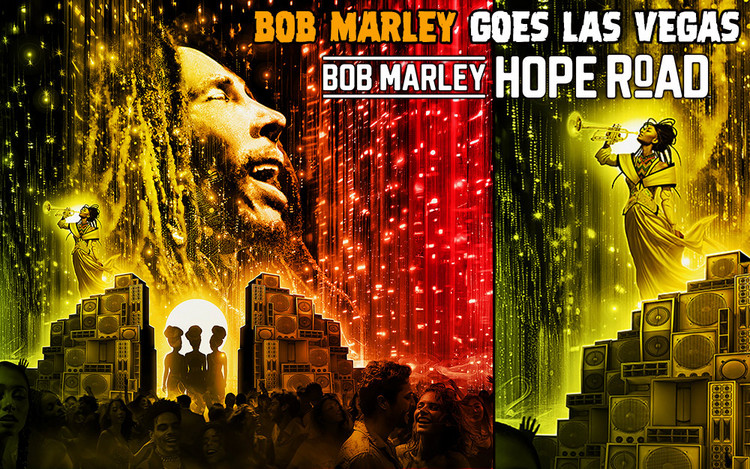Chronixx ADD
Reggaeville Riddim Corner #11 (November 2015)
12/08/2015 by Dan Dabber

Finding just one genuine artist to support in the wide range of genres that comprise contemporary American popular music would be at least daunting, if not impossible. Few write their own songs or try to do anything out of the ordinary. They safely lip sync their most iconic performances and obsess over their image more than their sound. They are more focused on marketing and social media than they are on music - singing dolls designed to lure the young and impressionable into a money vacuum. But there is an alternative to this approach where artists know and speak to real struggle and emotion. They write their own tunes and are so focused on the music that they sometimes ignore their image and online presence completely. They do not always have access to fancy studios and the best gear, but they find ways to be heard nonetheless. They take chances with their music, trying new concepts or reinventing old ones. Is this not how music should be? It’s how it has always been in Jamaica.
IZREAL RECORDS - ARK OF THE COVENANT RIDDIM  Although Izreal Records has released two great reggae riddims since their emergence in 2013, their ability to brand themselves leaves something to be desired. Their first release, Sellassie I Way Riddim, was credited to Israel Records; two words that, if searched as a pair, produce a sea of links containing statistics and documents associated with the nation of Israel. Perhaps this lack of googleablity was the reason that the Kingston-based label decided to change the spelling of their brand to Izreal Records for their newest release, Ark Of The Covenant Riddim. But if they were concerned about their ability to be found in web searches, they would probably have more to search for than just a Facebook page under their old spelling, “Israel Records” and with a profile pic of their logo, in which their name appears as “Izreal.” But this absence of web savvy speaks to the importance of the craft when it comes to small Jamaican labels like Izreal - the true workhorses of the reggae sound. Music is everything, and image is an afterthought. And, in the case of Israel or Izreal, it is the music that connects the dots that Google cannot.
Although Izreal Records has released two great reggae riddims since their emergence in 2013, their ability to brand themselves leaves something to be desired. Their first release, Sellassie I Way Riddim, was credited to Israel Records; two words that, if searched as a pair, produce a sea of links containing statistics and documents associated with the nation of Israel. Perhaps this lack of googleablity was the reason that the Kingston-based label decided to change the spelling of their brand to Izreal Records for their newest release, Ark Of The Covenant Riddim. But if they were concerned about their ability to be found in web searches, they would probably have more to search for than just a Facebook page under their old spelling, “Israel Records” and with a profile pic of their logo, in which their name appears as “Izreal.” But this absence of web savvy speaks to the importance of the craft when it comes to small Jamaican labels like Izreal - the true workhorses of the reggae sound. Music is everything, and image is an afterthought. And, in the case of Israel or Izreal, it is the music that connects the dots that Google cannot.
The 2013 juggling, Sellassie I Way, had an unmistakable roots-style and contained some powerful contributions from impactful artists like Jah9, Pressure, and Lutan Fyah. But Chronixx’s Prayer and the Tarrus Riley/Kabaka Pyramid combination, Fly Di Gate, were the definite standout versions from the release, and those recordings standout again on Ark Of The Covenant Riddim. It is certainly unusual for a label to use the same vocals for two releases, but the newer riddim has a much different feel, somewhere between R&B and slow, sexy dancehall, mainly driven by acoustic guitars, devoid of the iconic reggae skank. Chronixx, Kabaka, and Tarrus shine even brighter in these updates of their previously released tracks, and Izreal brought in some other heavy hitters like Sizzla, Shawn Storm, and Bugle to complement the selection with brand new versions of their own. These individual works add up to a greater whole that is conscious, heartfelt, and more proof of how real Izreal really is.
WALSHY FIRE - CONFESSIONAL RIDDIM  Walshy Fire’s name recognition has grown to epic levels since joining Major Lazer in 2011, but for eight years before that he was part of Miami’s popular Black Chiney sound system. Black Chiney is a notoriously well rounded sound, having excelled in clashing, as well as the production of clever, genre-blurring remixes and big riddim jugglings like 2005’s Kopa, 2006’s Higher Octane, and 2008’s Doctor Bird. Walshy’s involvement with Black Chiney made him a perfect fit for Diplo’s dancehall-crossover group, Major Lazer, and he has lent his production talents and cultural sensibilities to that outfit in many ways. Although Major Lazer has never officially released a dancehall riddim album, it has always felt inevitable, especially as Walshy continued to build his own audience, that one day he would return to his roots of producing riddim jugglings even if, judging by pop music standards, it would be a step backward for him. He enthusiastically took that step this month by releasing the riddim EP, Confessional, featuring four new cuts from artists Assassin aka Agent Sasco, Pressure, Antigua’s Carlos Turner, and female talent, Dyneque.
Walshy Fire’s name recognition has grown to epic levels since joining Major Lazer in 2011, but for eight years before that he was part of Miami’s popular Black Chiney sound system. Black Chiney is a notoriously well rounded sound, having excelled in clashing, as well as the production of clever, genre-blurring remixes and big riddim jugglings like 2005’s Kopa, 2006’s Higher Octane, and 2008’s Doctor Bird. Walshy’s involvement with Black Chiney made him a perfect fit for Diplo’s dancehall-crossover group, Major Lazer, and he has lent his production talents and cultural sensibilities to that outfit in many ways. Although Major Lazer has never officially released a dancehall riddim album, it has always felt inevitable, especially as Walshy continued to build his own audience, that one day he would return to his roots of producing riddim jugglings even if, judging by pop music standards, it would be a step backward for him. He enthusiastically took that step this month by releasing the riddim EP, Confessional, featuring four new cuts from artists Assassin aka Agent Sasco, Pressure, Antigua’s Carlos Turner, and female talent, Dyneque.
Listeners who know Walshy Fire from Major Lazer may be surprised by how little Confessional Riddim resembles the work for which the group is known. There are no drops or lasers and it won’t totally melt your face, bro… but Confessional is still chock full of influences from outside of Jamaica. Again, there is no reggae-defining skank, but like Ark Of The Covenant, there IS an acoustic guitar and this one is presented in a fashion that is more choppy, like a sample. This bright guitar loop along with a simplistic, heavily-reverbed rock drum pattern and percussive 808s give the vibe of this instrumental track more of a hip hop or R&B feel than reggae/dancehall, to an even greater degree than Ark Of The Covenant Riddim. But as devout fans of Jamaican music know, hip hop or R&B flavored productions are quite common in both reggae and dancehall, which means Confessional can blend musical influences without standing out too much in the dance, leaving it up to the artists to provide an attention-getting performance and the cultural grounding. All four vocalists follow through nicely for Walshy’s first solo riddim project, but Sasco’s titular Confession and Pressure’s On And On are most likely to captivate listeners.
JUGGLERZ RECORDS/WICKED VYBZ RECORDS - WUTENG RIDDIM  Occasionally a riddim project is creative beyond the fixed components of music and lyrics. Sometimes there’s a distinct theme that ties the whole project together or perhaps an original way of packaging or presenting the riddim. Wuteng Riddim, a joint effort between German-based Jugglerz Records and New York’s Wicked Vybz Records, has both a theme and an unusual presentation. The riddim is offered as two jugglings, Part 1 and Part 2. Although Part 2 has yet to be released, it is safe to assume that both albums will be centered around the same instrumental, though the specific producer or producers who built the riddim have not been credited to date. Part 1 includes seven vocal tracks featuring artists like Don Tippa, Skarra Mucci, and Zagga, who were all hand picked by Jugglerz Records. The second part, which will be Wicked Vybz Records’ release, is said to include artists such as Lutan Fyah, Bobby Hustle, and Exco Levi and scheduled to be available “soon.” Although riddims are commonly released in multiple jugglings and many labels have collaborated on riddims in the past, this is the first time I have seen a riddim where each record label contributing to a collaboration had their own release of the same riddim. It may have happened before, but it is very rare.
Occasionally a riddim project is creative beyond the fixed components of music and lyrics. Sometimes there’s a distinct theme that ties the whole project together or perhaps an original way of packaging or presenting the riddim. Wuteng Riddim, a joint effort between German-based Jugglerz Records and New York’s Wicked Vybz Records, has both a theme and an unusual presentation. The riddim is offered as two jugglings, Part 1 and Part 2. Although Part 2 has yet to be released, it is safe to assume that both albums will be centered around the same instrumental, though the specific producer or producers who built the riddim have not been credited to date. Part 1 includes seven vocal tracks featuring artists like Don Tippa, Skarra Mucci, and Zagga, who were all hand picked by Jugglerz Records. The second part, which will be Wicked Vybz Records’ release, is said to include artists such as Lutan Fyah, Bobby Hustle, and Exco Levi and scheduled to be available “soon.” Although riddims are commonly released in multiple jugglings and many labels have collaborated on riddims in the past, this is the first time I have seen a riddim where each record label contributing to a collaboration had their own release of the same riddim. It may have happened before, but it is very rare.
However interesting the presentation of Wuteng, the theme of the riddim is the star of the show since the vibe of the instrumental as well as the riddim’s title are thematically linked. Jugglerz describes Wuteng Riddim as “bring[ing] back the original vibes of hip hop and dancehall in the 90’s… the Golden Era of reggae, hip hop, and Phillie Blunts.” They also say, “the riddim sounds just a bit like [the Golden Era’s] most notorious protagonists,” referring to the nod to Wu-Tang Clan in the riddim’s title. Whether or not today’s youth recognize these references is of no concern to me, someone who came of age during the Golden Era and who religiously listened to the music to which Wuteng pays homage. It was also at this time that I was first introduced to reggae, a music that would eventually become my obsession. So my heart is very close to the premise of this release, which may make me more fond of it than the average listener, but also more critical of it. For instance, Wuteng is constructed in the style of the synthesizer-oriented Wu-Tang Forever double disc from 1997, specifically RZA’s acclaimed production, Triumph. But hip hop’s Golden Era is generally understood to have taken place in the early part of the 90’s, when Wu-Tang was just starting to attract national attention with their first album, Enter The Wu-Tang: 36 Chambers from 1993, a project that featured a sample-oriented production approach from RZA. So the Wuteng Riddim does not truly represent the sound of the Golden Era, but it is a good approximation of a sound that is unmistakingly Wu. Despite these minor inconsistencies, Wuteng Riddim is still very cool on a conceptual level, and the versions that have been released so far are nice, especially the consistently impressive Gappy Ranks, who makes the riddim feel more at home in 2015 with his version, Gunman.
LOCKECITY MUSIC GROUP - BAD UP RIDDIM  Lockecity Music Group’s Adrian Locke came to prominence with his two brothers, Steve and Andrew, working out of a small studio built into the back of a cargo truck. Truck Back Records, as the trio would come to be known, had a huge hit riddim in 2008 with Gearbox, a juggling that included big tunes like Erupt’s Click Mi Finger, Beenie Man’s Bad Man Story, and Harry Toddler’s (credited as Blonde Ras) Don’t Run In. Since then, Truck Back Records has been a major force in dancehall, releasing a constant stream of consistently good records that have covered a wide swath of the dancehall spectrum. In recent years, Adrian broke off to form his own label, Lockecity Music Group. The brothers still work together quite often, now crediting their collaborative works jointly, “Truck Back Records/Lockecity Music Group,” as seen on their 2013 sexy smash single, Dye Dye by Macka Diamond. 2015 has largely been a year of solo production endeavors for Adrian, and the noted absence of family assistance has not caused either the quality or quantity of Lockecity’s riddim releases to suffer in any way. The newest juggling from Lockecity, Bad Up, is the third riddim album of the year for Adrian, preceded by Bou Yah and Good Love, two riddims that could not be further from the quirky, creepy vibes of Bad Up.
Lockecity Music Group’s Adrian Locke came to prominence with his two brothers, Steve and Andrew, working out of a small studio built into the back of a cargo truck. Truck Back Records, as the trio would come to be known, had a huge hit riddim in 2008 with Gearbox, a juggling that included big tunes like Erupt’s Click Mi Finger, Beenie Man’s Bad Man Story, and Harry Toddler’s (credited as Blonde Ras) Don’t Run In. Since then, Truck Back Records has been a major force in dancehall, releasing a constant stream of consistently good records that have covered a wide swath of the dancehall spectrum. In recent years, Adrian broke off to form his own label, Lockecity Music Group. The brothers still work together quite often, now crediting their collaborative works jointly, “Truck Back Records/Lockecity Music Group,” as seen on their 2013 sexy smash single, Dye Dye by Macka Diamond. 2015 has largely been a year of solo production endeavors for Adrian, and the noted absence of family assistance has not caused either the quality or quantity of Lockecity’s riddim releases to suffer in any way. The newest juggling from Lockecity, Bad Up, is the third riddim album of the year for Adrian, preceded by Bou Yah and Good Love, two riddims that could not be further from the quirky, creepy vibes of Bad Up.
The fidgety organ loop that gives Bad Up its dark, wild energy is the most memorable component of the new riddim, harkening back to a time when dancehall was more dependent on samples than synthesizers. But Bad Up is, at its core, a modern dancehall riddim with furious snare fills, dizzying effects, a lower mid-range talking synth bass, and a repetitive syncopated staccato string section. Despite its aggression and tendency to conjure visions of disfigured opera house phantoms, Bad Up also has a quirky bounce that gives the harder riddim just enough approachability to allow its dance-inspiring rhythms to do their job. A wide range of artists, some more well known than others, add their unique styles to the project. Kip Rich’s Bad Up U Self was probably the inspiration for the title of the juggling, though the titles of New Kidz' brilliant Bad Inna Real Life and Sashae’s Baddest Gyal Dem Ever See suggest that it was the riddim’s name that inspired the artists’ songwriting and not the other way around. The badness continues with Beenie Man and Sizzla, who each provide versions that have potential to get noticed in the dance. Sizzla’s conscious take on Bad Up, So Many Tings, has all the hallmarks of the late 90’s/early 2000’s Sizzla tracks that helped him become the dancehall icon that he is today. And Beenie, the King Of The Dancehall, looks for answers from badmind with How U Dweet, the exact kind of anthem that can again reaffirm the king’s royal standing.
LISTEN TO THE FOUR RIDDIMS HERE:









